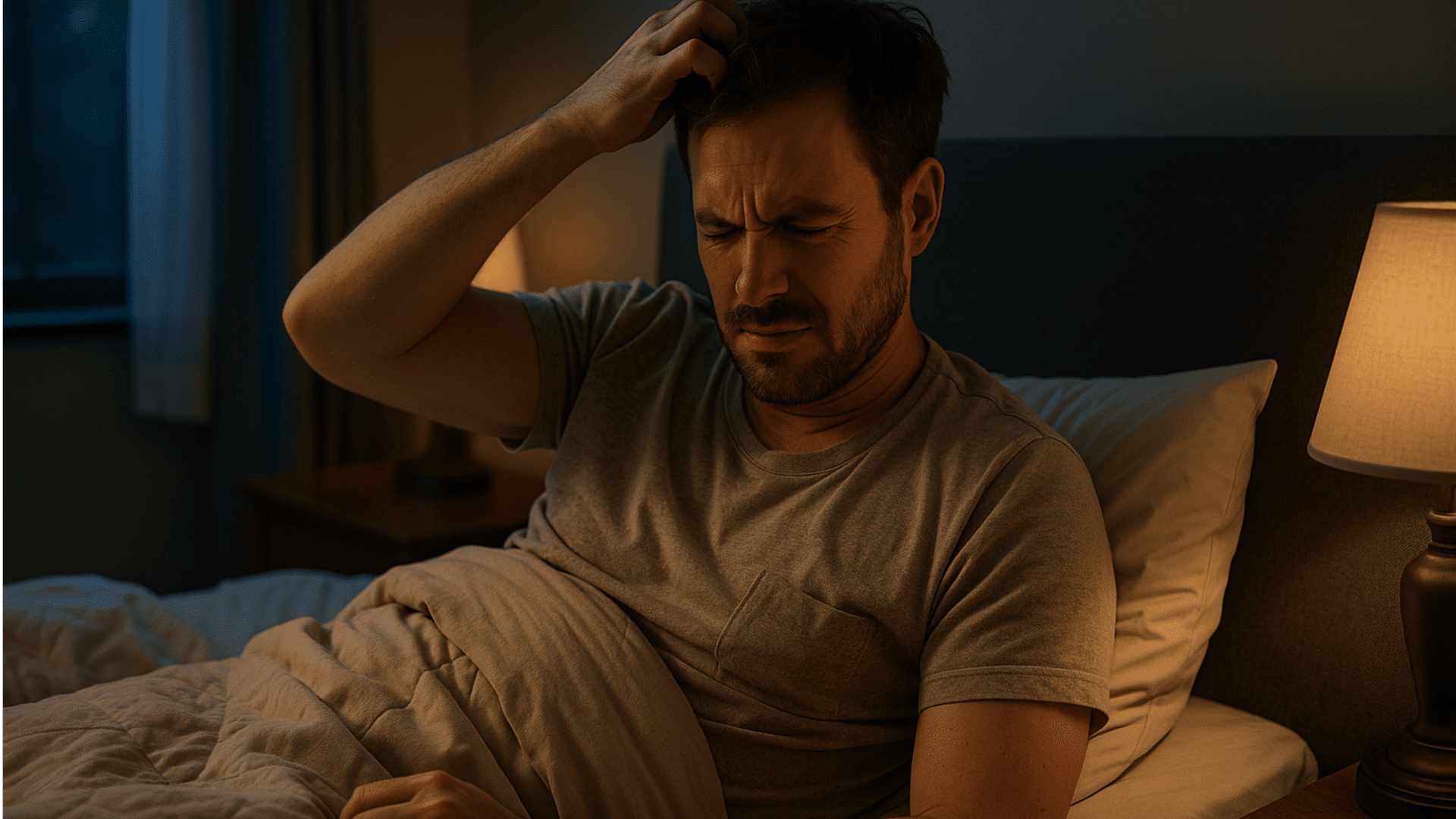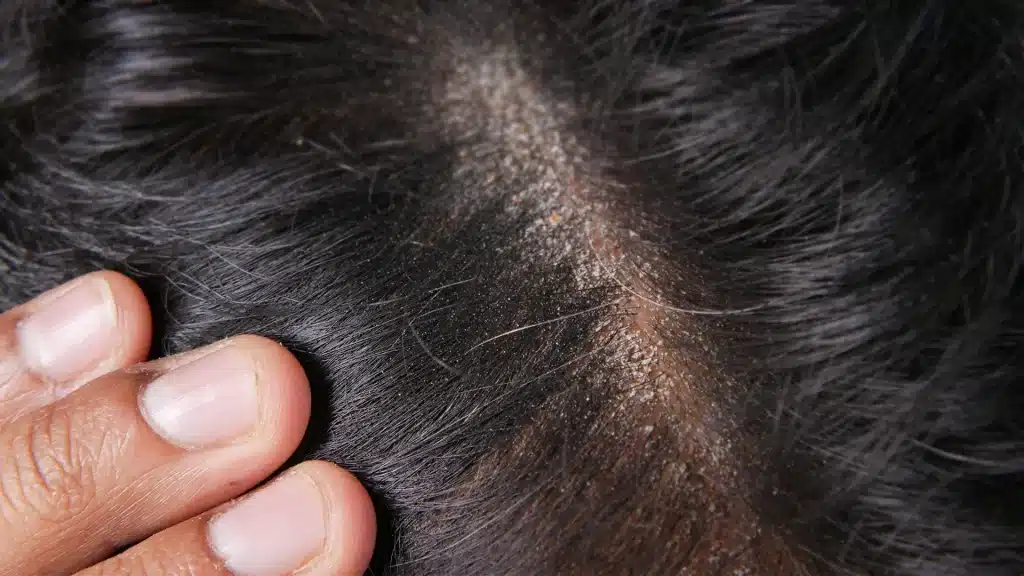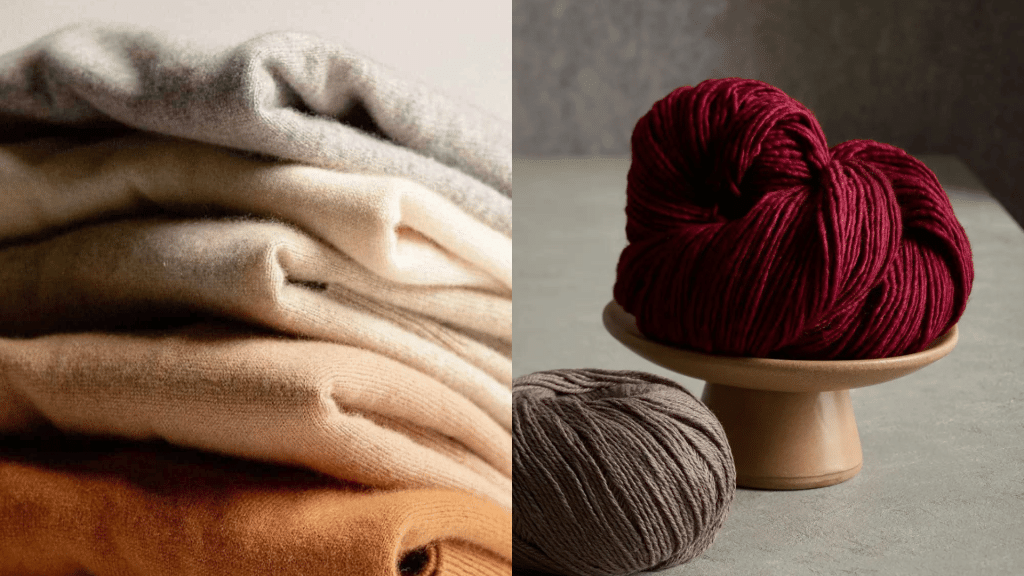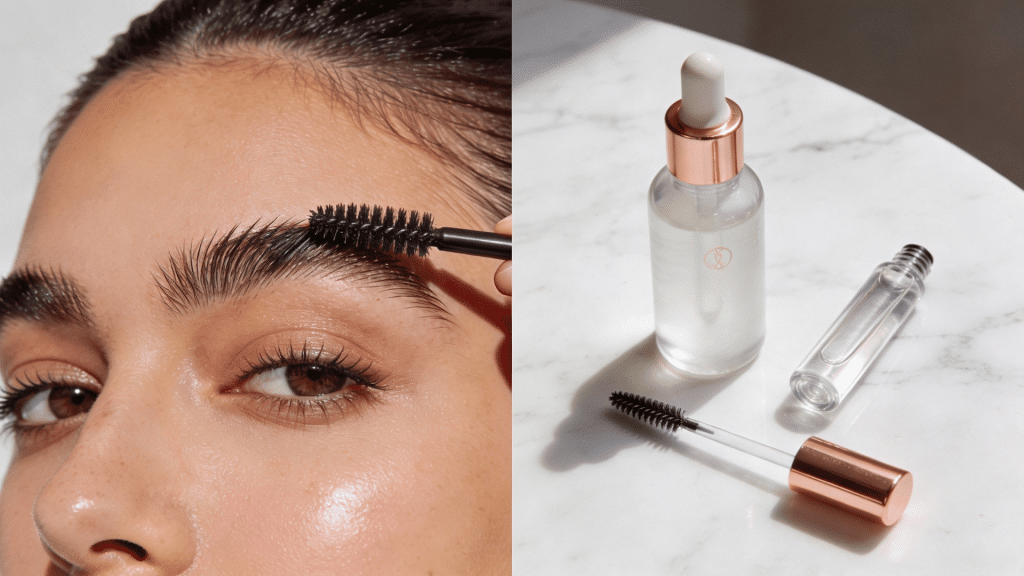Many people experience frustrating scalp itching that worsens at bedtime. This nighttime irritation can disrupt sleep and leave individuals wondering why their head is so itchy at night.
The problem often intensifies when lying down, making it difficult to get proper rest.
Understanding the root causes behind nocturnal scalp itching is essential for finding effective solutions. From hormonal changes to environmental factors, several triggers contribute to this common issue.
We will help you figure out main reasons behind nighttime scalp itching and provide practical remedies to help readers achieve itch-free, comfortable nights.
Disclaimer: Some images in this blog may be graphic or disturbing. They are for educational purposes only and not for self-diagnosis or treatment. Please consult a healthcare professional for any symptoms. Viewer discretion is advised.
Why Scalp Itch Is Worst at Night
Several factors make scalp itching more intense during nighttime hours. Body temperature naturally rises when lying down, which increases blood flow to the scalp and amplifies itching sensations.
Additionally, the body’s cortisol levels drop at night, reducing the natural anti-inflammatory response that helps control itching during the day.
Nighttime triggers include:
- Pillow friction against the scalp
- Accumulated sweat and oils from the day
- Dry indoor air from heating systems
- Increased focus on bodily sensations when trying to sleep
The horizontal sleeping position also restricts air circulation around the scalp, creating a warm, humid environment that can worsen existing skin conditions and bacterial growth.
Causes of Scalp Itch at Night
An itchy scalp at night can be caused by various issues, ranging from dry skin to more serious medical conditions.
The discomfort often feels stronger at bedtime because heat, sweat, and fewer distractions make the sensation more noticeable. Knowing the root cause is the first step toward lasting relief.
1. Dry Scalp
A dry scalp happens when there is not enough natural oil to stay moisturized. It can feel tight, itchy, and flaky, especially in cold or heated indoor air.
People often confuse it with dandruff, but the flakes are usually smaller and whiter.
- Cause: Loss of natural oils from harsh shampoos, hot showers, or dry environments.
- Signs: Small white flakes, tight skin, and mild itch without redness.
- How to Fix: Use a gentle moisturizing shampoo and apply a light natural oil once or twice weekly.
2. Dandruff
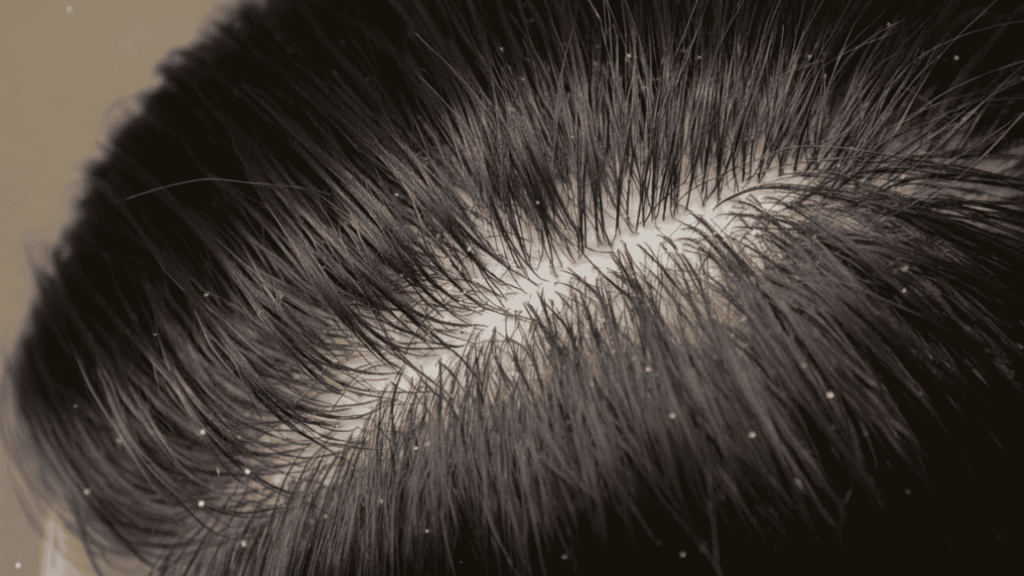
Dandruff is a very common scalp issue that causes flaking and itching. It happens when extra oil on the scalp feeds yeast, irritating the skin. The result is flakes that show up on hair and clothing, often worse at night.
- Cause: Overproduction of oil leads to yeast growth and scalp inflammation.
- Signs: White or yellow flakes, greasy roots, and persistent itch that worsens in warm rooms.
- How to Fix: Wash with anti-dandruff shampoo containing zinc pyrithione or ketoconazole to reduce yeast.
3. Psoriasis
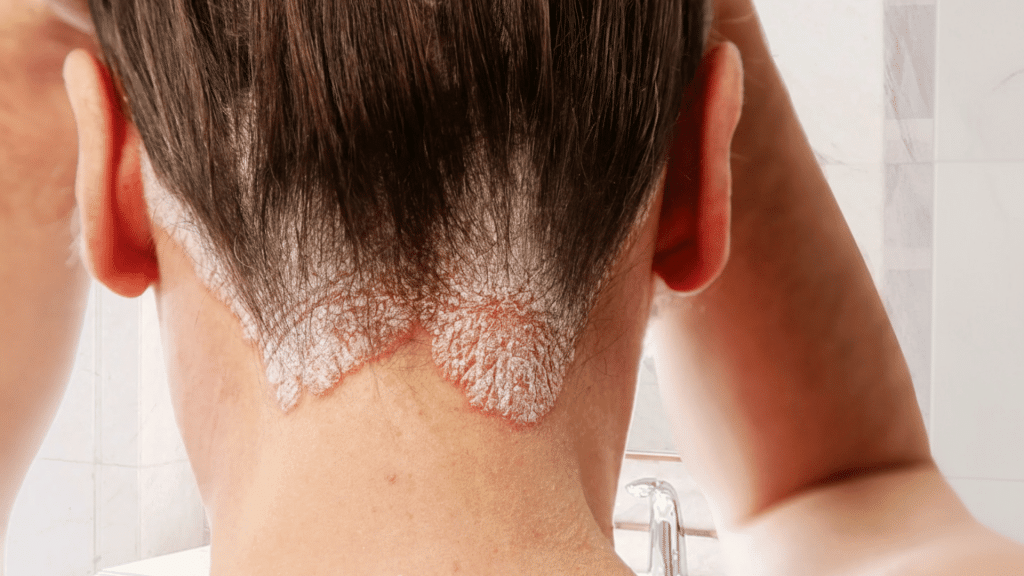
Psoriasis is an autoimmune condition where the skin grows too quickly, forming thick patches. On the scalp, these appear as silvery scales with redness underneath.
The itch can become intense, especially when trying to rest at night.
- Cause: Overactive immune system causes rapid skin cell buildup.
- Signs: Thick, silvery patches with redness, itching, and sometimes pain.
- How to Fix: Use medicated shampoos or topical treatments recommended by a dermatologist.
4. Eczema
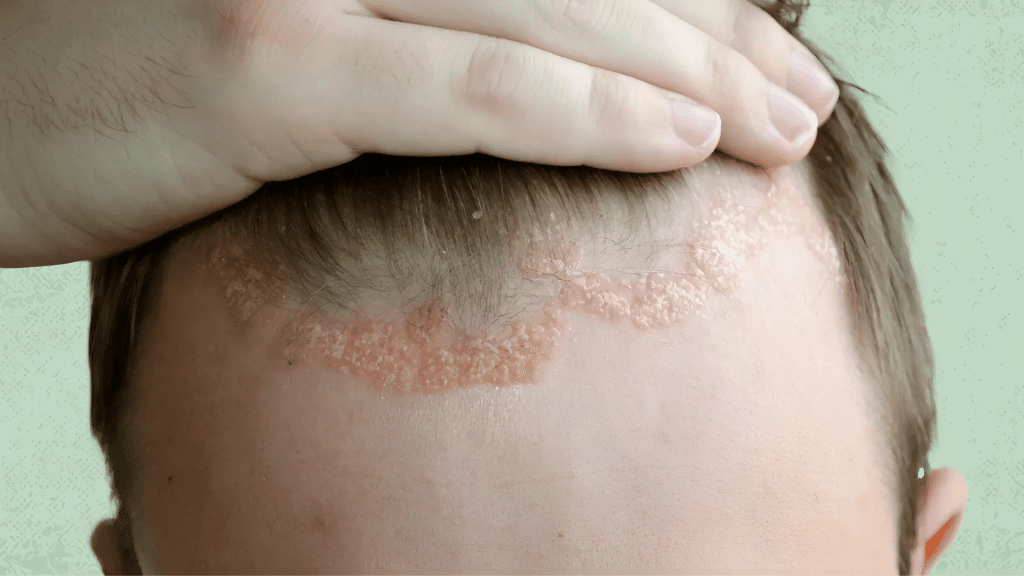
Eczema is a chronic skin condition that can flare on the scalp, making it dry and itchy. It’s often linked to allergies or skin sensitivity. Nighttime itching is common because the skin naturally loses moisture while sleeping.
- Cause: Skin barrier problems allow irritants and allergens to trigger inflammation.
- Signs: Red, dry, inflamed patches that may ooze or crust.
- How to Fix: Choose fragrance-free shampoos and apply a gentle moisturizer on the scalp.
5. Contact Dermatitis
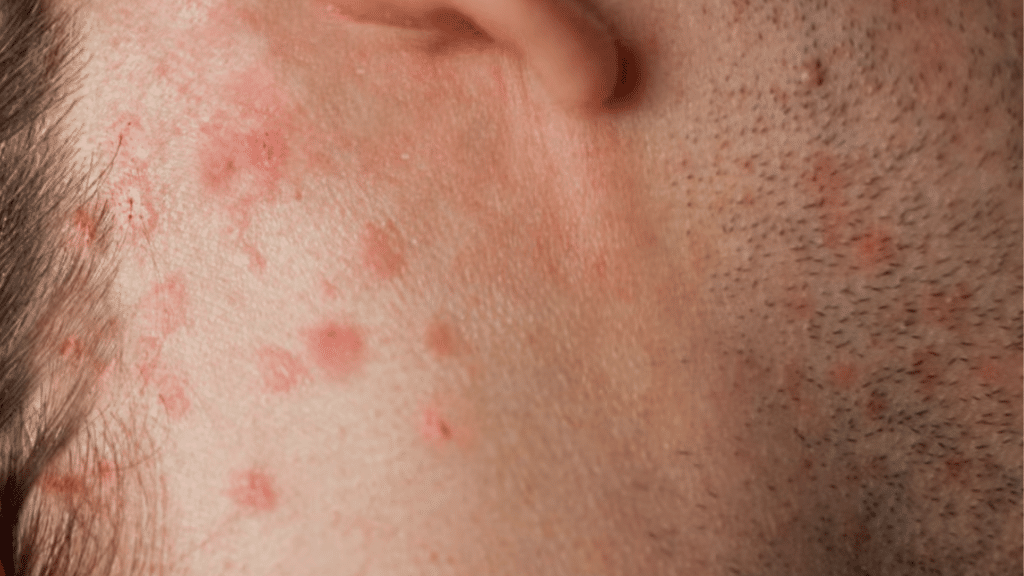
Contact dermatitis happens when the scalp reacts to certain products. This can include hair dye, shampoo, styling sprays, or even laundry detergent left on pillowcases.
The reaction causes redness and itching that often lasts into the night.
- Cause: Allergic or irritant reaction to chemicals or harsh ingredients.
- Signs: Sudden redness, burning, or intense itch after product use.
- How to Fix: Stop using the suspected product and rinse hair and bedding thoroughly.
6. Fungal infections
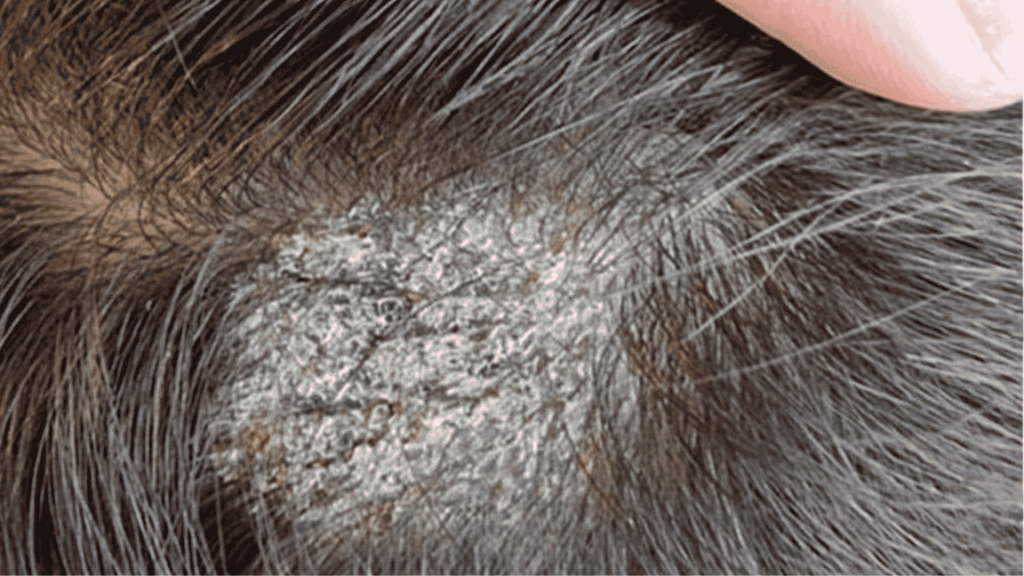
Scalp ringworm is a contagious fungal infection that creates circular bald spots. It often causes redness, scaling, and a deep itch that doesn’t improve with regular shampoo.
The discomfort is often worse when heat builds up at night.
- Cause: Fungal overgrowth infects scalp skin and hair shafts.
- Signs: Round bald patches, redness, scaling, and strong itch.
- How to Fix: See a doctor for antifungal shampoo or prescription oral medication.
7. Heat Rash
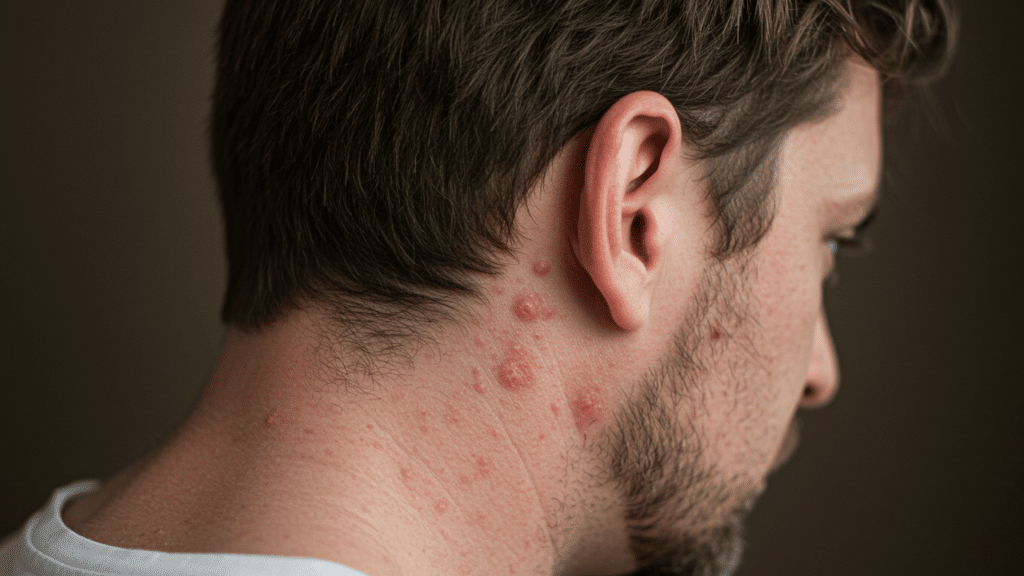
Heat rash forms when sweat ducts get blocked, causing small itchy bumps. On the scalp, it feels prickly and irritating, especially under heavy blankets. It’s more common in hot, humid bedrooms.
- Cause: Clogged sweat ducts prevent sweat from escaping.
- Signs: Tiny red bumps, prickly itch, and discomfort in warm conditions.
- How to Fix: Cool the sleeping environment and gently wash away sweat buildup.
8. Sunburned Scalp
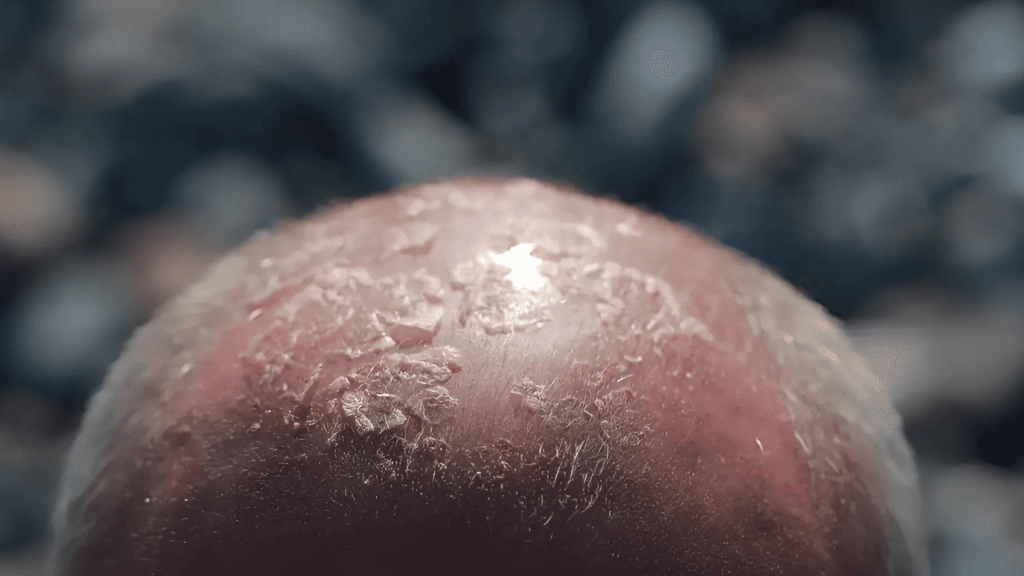
A sunburned scalp often goes unnoticed until peeling and itching begin.
The healing process leads to dryness and irritation, which can be more noticeable at night. Pain and tenderness may also be present.
- Cause: UV rays damage scalp skin after sun exposure.
- Signs: Redness, soreness, peeling, and itchy patches.
- How to Fix: Apply soothing aloe vera or a cooling gel and wear hats in the sun.
9. Scalp Folliculitis
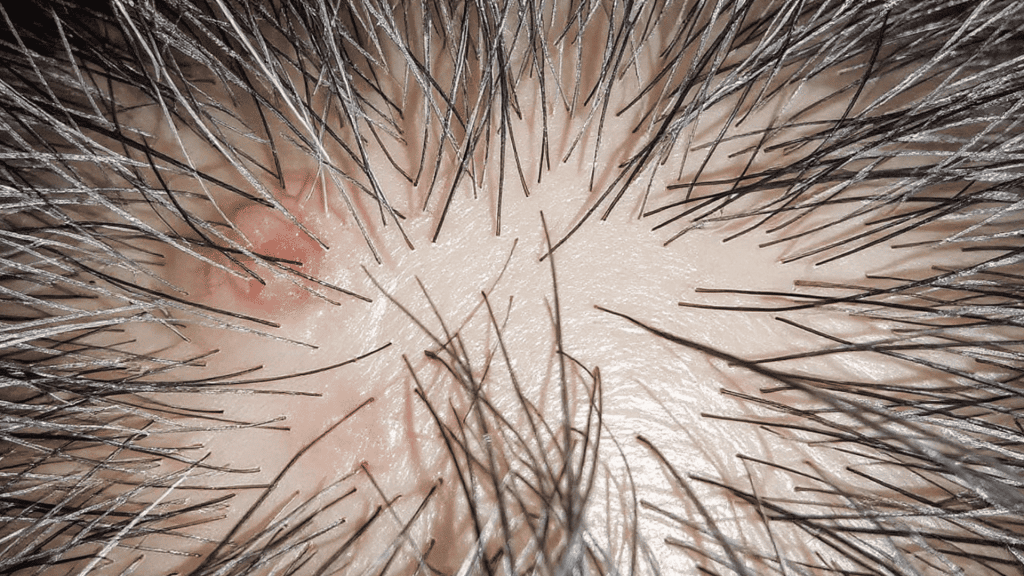
Folliculitis is when hair follicles get infected by bacteria. On the scalp, it shows up as red bumps or pus spots that itch or hurt. Friction from pillows at night can make the irritation worse.
- Cause: Bacterial infection in the hair follicles.
- Signs: Red bumps, tender spots, and itchy pimples on the scalp.
- How to Fix: Use antibacterial wash and see a doctor if painful or spreading.
10. Scarring Alopecia
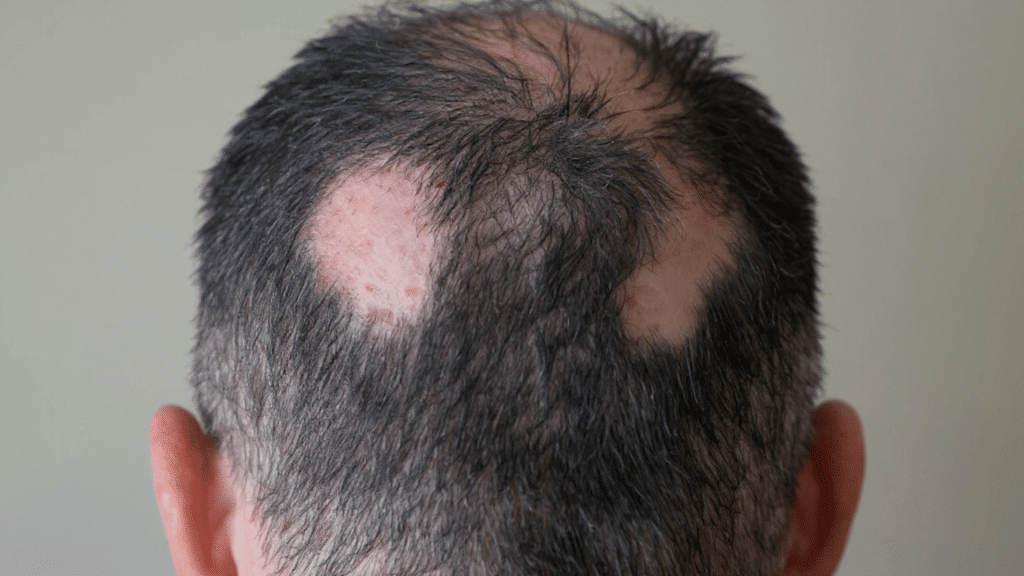
This rare condition causes permanent hair loss because inflammation destroys follicles.
Along with bald patches, it can create burning, itching, or pain. Symptoms may flare at night when the scalp is warm.
- Cause: Autoimmune or inflammatory damage to hair follicles.
- Signs: Bald spots, redness, itching, and scalp discomfort.
- How to Fix: Get early treatment from a dermatologist to prevent further loss.
Other Causes
Not all itchy scalp problems come from dandruff or dryness. Sometimes the issue is linked to lifestyle habits, medical conditions, or even changes in the sleep environment.
These less obvious causes can still trigger discomfort, especially at night, and are worth understanding for better relief.
11. Head Lice
Head lice are tiny insects that live on the scalp and feed on blood. Their bites cause constant itching, and the crawling sensation is often noticed more at night. Children are especially prone, but anyone can get them.
- Cause: Parasites attach to hair shafts and bite the scalp.
- Signs: Intense itch, sores from scratching, and visible nits (eggs) near the roots.
- How to Fix: Use over-the-counter lice treatment and wash bedding, hats, and combs in hot water.
12. Excessive Sweating
Sweating during sleep can leave the scalp damp for hours. Sweat mixes with oil and dirt, irritating the skin and sometimes leading to odor or infections. This is a common reason people notice itch mainly at bedtime.
- Cause: Night sweats trap sweat and oil against the scalp.
- Signs: Damp hair, prickly sensation, and itching that worsens with heat.
- How to Fix: Shower or rinse hair after sweating and keep the bedroom cool and ventilated.
13. Hormonal Changes
Hormone shifts can make the scalp more sensitive and itchy.
For example, during pregnancy, menopause, or when cortisol dips at night, scalp irritation feels worse. Hormones also affect oil production and skin hydration.
- Cause: Hormonal fluctuations reduce skin stability and increase sensitivity.
- Signs: Scalp dryness, flare-ups, or worsening itch during certain life stages.
- How to Fix: Use gentle scalp products and consult a doctor if symptoms persist.
14. Changes in Body Temperature at Night
When the body warms up under blankets, blood vessels expand and nerves become more sensitive. This makes itchiness feel stronger, even if it’s mild during the day. People often notice it soon after lying down.
- Cause: Rising body heat at night stimulates nerve endings.
- Signs: Scalp feels hotter with stronger itching when resting.
- How to Fix: Use lighter bedding and maintain a cooler bedroom temperature.
15. Poor Hygiene
Not washing hair regularly can lead to a buildup of oil, sweat, and dirt. This creates the perfect environment for itching, odor, and scalp irritation. At night, the oils transfer to bedding, making it worse.
- Cause: Infrequent washing leaves sweat and dirt trapped on scalp.
- Signs: Greasy hair, odor, flakes, and persistent itch.
- How to Fix: Wash regularly with a gentle shampoo and change pillowcases often.
16. Product Buildup
Hair gels, sprays, and heavy conditioners can leave behind residue that clogs pores. Over time, this buildup weighs down hair and makes the scalp itchy. It’s often more noticeable after lying on a pillow.
- Cause: Residue from styling products blocks scalp pores.
- Signs: Heavy, dull hair with flakes and itchy scalp.
- How to Fix: Use a clarifying shampoo once a week to remove buildup.
17. Stress or Anxiety
Stress doesn’t directly cause scalp problems but makes nerves more sensitive. People may also scratch more when anxious, worsening irritation. Itching often feels strongest at night when the mind is less distracted.
- Cause: Stress hormones heighten nerve sensitivity in the skin.
- Signs: Itching without clear rash, often worse before bedtime.
- How to Fix: Relaxation practices, breathing exercises, or gentle scalp massage.
18. Nerve Irritation
Sometimes scalp itch comes from nerve damage, not skin problems. Conditions like shingles, diabetes, or injuries can irritate scalp nerves.
The result is burning, tingling, or crawling sensations, often worse when quiet at night.
- Cause: Nerve damage or irritation sends false itch signals.
- Signs: Tingling, burning, or crawling sensation without rash.
- How to Fix: Seek medical care; treatment may involve nerve pain medication.
19. Systemic Conditions
Health issues like liver disease, kidney problems, or thyroid disorders can make the scalp itchy. This type of itch usually comes with other symptoms like fatigue or changes in weight. It often disturbs sleep.
- Cause: Underlying health problems affect skin balance and nerves.
- Signs: Widespread itching along with tiredness or other body symptoms.
- How to Fix: Consult a doctor if scalp itch is constant or linked to other issues.
20. Iron Deficiency Anemia
When the body doesn’t have enough iron, the skin and scalp may become itchy. Fatigue, pale skin, and weakness usually appear too. The itch can feel stronger at night when the body is run down.
- Cause: Low iron levels reduce oxygen supply to scalp tissues.
- Signs: Pale skin, tiredness, hair shedding, and itchy scalp.
- How to Fix: Eat iron-rich foods or take supplements under a doctor’s advice.
21. Diabetes
High blood sugar dries out skin and feeds yeast, leading to itch and infections. People with diabetes may notice frequent scalp dryness and fungal growth. Warm, sweaty conditions at night make symptoms worse.
- Cause: Poorly controlled blood sugar damages skin and encourages fungus.
- Signs: Dry, itchy scalp with repeated yeast infections.
- How to Fix: Keep blood sugar in range and use gentle scalp cleansers.
22. Uncomfortable Sleep Environment
Sometimes the itch comes from the bed itself, not the scalp. Rough fabrics, sweat-soaked pillows, or dust mites can trigger nighttime irritation. This type of itch usually disappears during the day.
- Cause: Irritating bedding, trapped sweat, or allergens in pillows.
- Signs: Scalp itching mostly while lying in bed.
- How to Fix: Wash sheets often, use breathable pillowcases, and keep bedding clean.
Nighttime scalp itch arises from various causes, including skin, lifestyle, and health issues. Different triggers affect each person, making pattern recognition crucial. Knowing the cause simplifies finding the remedy.
Home Remedies to Try

Simple home remedies can bring big relief when the scalp feels itchy at night. Many natural ingredients work to calm irritation, restore moisture, and keep the scalp balanced.
These easy methods are safe, affordable, and can be done right from home.
1. Olive Oil Overnight Softener
Olive oil is rich in healthy fats that deeply moisturize and soften the scalp. It reduces dryness, flakes, and itchiness while promoting smoother, healthier hair.
- How to Make: Use extra virgin olive oil, slightly warmed.
- How to Use: Massage gently into the scalp, leave for 30 minutes or overnight, then wash out with mild shampoo.
- Best Time to Apply: Evening, before bedtime wash, for maximum absorption.
2. Aloe Vera Cooling Gel
Aloe vera naturally soothes irritated skin, cools inflammation, and adds moisture to a dry scalp. It helps relieve itching and promotes a refreshing, calm feeling.
- How to Make: Use fresh aloe gel scooped from the leaf or store-bought pure aloe gel.
- How to Use: Apply directly to the scalp, leave for 20 minutes, then rinse.
- Best Time to Apply: After a long day or post-shower for cooling relief.
3. Coconut Oil Comfort Massage
Coconut oil hydrates deeply and provides mild antibacterial benefits. It calms irritation, reduces flakes, and supports scalp health while improving hair shine.
- How to Make: Use cold-pressed virgin coconut oil, warmed slightly for easier application.
- How to Use: Massage into the scalp for 5–10 minutes, leave for an hour or overnight, then rinse.
- Best Time to Apply: Evening or weekend nights when there’s time for a long treatment.
4. Tea Tree Oil Scalp Rescue
Tea tree oil is known for its antifungal and antibacterial powers. It helps fight dandruff, reduce itching, and clear minor scalp infections.
- How to Make: Mix 3–4 drops of tea tree oil with 2 tablespoons of coconut or olive oil.
- How to Use: Massage onto the scalp, leave for 15–20 minutes, then rinse with mild shampoo.
- Best Time to Apply: Once or twice weekly, before a shower.
5. Apple Cider Vinegar Rinse Reset
Apple cider vinegar balances scalp pH, reduces flaking, and removes product buildup. It refreshes the scalp and leaves hair softer and shinier.
- How to Make: Mix 1 part apple cider vinegar with 2 parts water.
- How to Use: After shampooing, pour the mix onto the scalp, leave for 5 minutes, then rinse.
- Best Time to Apply: After washing hair, once or twice a week.
6. Cool Water Quick Refresh
Cool water helps wash away sweat, dirt, and product buildup that can irritate the scalp. It instantly refreshes and reduces heat-related itching.
- How to Make: No prep needed—just clean, cool water.
- How to Use: Rinse the scalp after workouts, sweating, or before bedtime.
- Best Time to Apply: Post-exercise or on hot nights before sleep.
7. Neem Leaf Herbal Wash
Neem has strong antibacterial and antifungal properties that naturally fight dandruff and scalp irritation. It leaves the scalp feeling fresh and clean.
- How to Make: Boil neem leaves in water for 10 minutes, then strain.
- How to Use: Rinse the scalp with cooled neem water after shampooing.
- Best Time to Apply: Weekly, after a hair wash, to keep scalp clear.
8. Soothing Oatmeal Paste
Oatmeal calms dryness and irritation with its anti-inflammatory properties. It provides gentle relief for sensitive scalps and reduces redness.
- How to Make: Mix 2 tablespoons of ground oatmeal with warm water to form a paste.
- How to Use: Apply paste to the scalp, leave for 15 minutes, then rinse with mild shampoo.
- Best Time to Apply: Evening, when the scalp feels extra dry or itchy.
9. Lemon Fresh Scalp Rinse
Lemon juice naturally cleanses, reduces dandruff, and leaves the scalp refreshed. Its antifungal properties help control itch and flakes.
- How to Make: Mix 2 tablespoons of lemon juice with 1 cup of water.
- How to Use: Pour onto the scalp after shampooing, leave for 5 minutes, then rinse.
- Best Time to Apply: Once a week, after cleansing the scalp.
10. Baking Soda Scalp Scrub
Baking soda gently exfoliates, removing buildup and flakes while calming scalp irritation. It restores freshness and helps balance oil levels.
How to Make: Mix 1 tablespoon of baking soda with enough water to form a paste.
How to Use: Massage paste onto damp scalp, leave for 5 minutes, then rinse thoroughly.
Best Time to Apply: Once every two weeks, before shampooing.
11. Honey Hydration Mask
Honey deeply hydrates the scalp and has natural antimicrobial benefits. It locks in moisture, reduces itching, and helps heal irritation.
How to Make: Use raw honey or mix with a few drops of olive oil.
How to Use: Spread a thin layer on the scalp, leave for 20 minutes, then wash with lukewarm water.
Best Time to Apply: Evening, before a gentle hair wash, when scalp feels dry.
Trying out these remedies helps ease nighttime itching without harsh treatments. Each one works in a different way, so finding the right match depends on personal needs. With a little consistency, the scalp can feel healthier, calmer, and more comfortable at night.
Prevention Strategies
Managing scalp irritation requires simple lifestyle adjustments that address both external and internal factors.
- Establish gentle bedtime hair care: Brush softly to distribute oils and remove debris
- Maintain cool bedroom temperatures (65-68°F): To prevent irritating sweat buildup
- Reduce inflammatory foods: Such as sugar, while increasing omega-3 fatty acids for skin health
- Stay hydrated and exercise regularly: Shower promptly after workouts to prevent sweat irritation
- Choose hypoallergenic laundry detergents: For bedding to eliminate chemical irritants during sleep
These comprehensive strategies work together to create optimal conditions for scalp healing and comfort.
When to See a Doctor
Most nighttime scalp itching resolves with proper care, but certain symptoms require medical attention. Recognizing warning signs helps determine when a professional evaluation becomes necessary.
- Persistent itching lasting more than two weeks despite consistent home treatment and proper scalp care routines
- Severe scratching causing bleeding or open wounds that create a risk of secondary bacterial infections
- Signs of infection, including pus, red streaks, or swelling around affected scalp areas, require immediate attention
- Hair loss in patches or noticeable thinning areas may indicate underlying dermatological conditions
- Intense itching with fever or rash spreading beyond the scalp, suggesting systemic health issues needing urgent care
Early professional treatment prevents complications and provides targeted relief. A dermatologist can accurately diagnose conditions like seborrheic dermatitis or fungal infections.
Conclusion
Nighttime scalp itching disrupts sleep for countless individuals, causing constant discomfort. Understanding causes such as increased body temperature and hormonal changes helps people regain control over their scalp health.
The combination of environmental factors, daily habits, and individual triggers creates the perfect storm for nocturnal itching episodes.
Basic changes, such as temperature control, proper hygiene, and appropriate bedding, can significantly help reduce night sweats. Persistent symptoms may indicate underlying conditions requiring medical attention.
Ready to reclaim nights? Implement these solutions tonight for relief from an itchy scalp during sleep.

